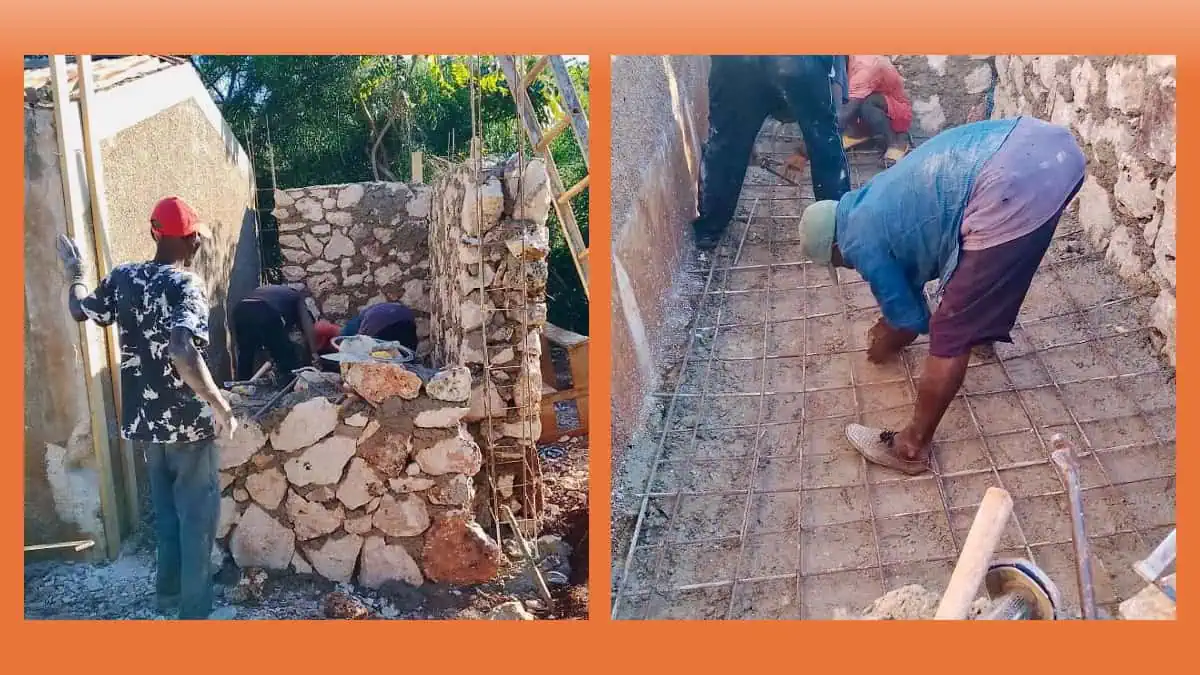
by Kent Annan
He’d threatened to do it during each of my last few visits to see them when I was in Haiti.
When I woke up in the middle of the night, drowsy in the faint glow of a kerosene lamp, I heard some rustling outside. Maybe it’s the chickens or a goat that got loose. Who knows? I rolled over to concentrate on falling back asleep… and on not sweating under the tin roof that still seemed to be radiating down the June sun’s heat.
Père (left), the patriarch of the family that hosted Shelly Satran (center) and Kent Annan (right) when they first arrived in Haiti.
Not much later, I heard more rustling—and voices. And I realized what was happening. Père, the grandfather of the family that my wife, Shelly, and I had lived with when we first moved to Haiti three years ago, was really doing it. He was killing one of their few turkeys.
I lay there a few more minutes, trying not to sweat, and then smiled. I’m going out there. We’re having turkey!
And even though it was the middle of June, as I got out of bed that night, it felt like we were preparing for a sort of summer Christmas celebration with traditional turkey: a celebration of incarnation.
God came to be with us. That’s the outrageous, hopeful claim of Christmas. We are not alone; we have ultimate hope despite headline appearances to the contrary. Christmas is a reminder that God loves us—not just from a distance, but deeply and personally.
And Christians then get to respond to the implications this has for our lives: “Therefore be imitators of God, as beloved children, and live in love, as Christ loved us and gave himself up for us, a fragrant offering and sacrifice to God” (Ephesians 5:1-2).
We get to receive the love of the incarnation—and then respond in kind, in so much as that’s possible for us. We’re supposed to be incarnations of God’s love and justice to one another in the world.
Chama, the daughter-in-law in our host family, preparing a meal for us back in 2003.
This will look differently in each of our lives. For me as I sat next to Chama, Abdias, and Johnny at 2:30 in the morning (Père had gone back to sleep after killing the turkey and left his daughter and grandsons to start the preparations), I felt acutely aware of how I’d experienced the incarnation in this place.
This family with whom we had lived for seven months and have visited often since, has been to me an incarnation of generosity and hospitality, of courage and faith in the midst of a life that’s often not easy. I hope I’ve followed the example of the incarnation at least in my attempts to be humble (not too hard as one stumbles into a new language and culture!) in a place far from my home. Now, as I think back on that morning, it seems we were celebrating the gift of incarnation by seeking to be with each other, to each give what we have to give, and to love.
Leah Murphy, Cara Kennedy, and Kim Montroll are right now in the midst of their own, similar experiences in our Apprenticeship in Shared Living program, as each of them lives with and learns from different rural Haitian families. (Read more about the lives of our current apprentices.)
Anna Dioguardi is following a similar model as she starts a new program in the Dominican Republic. (Read more about Anna’s adventures in the Dominican Republic.) I’m now living near Miami and traveling back and forth to Haiti, but still feel I’m on this adventure of being an apprentice of the incarnation. Wherever we are, we can be on this adventure of living out God’s love with our families and neighbors, in our churches, and at our jobs.
As the sun rose that morning, others in the family awoke and joined us with sleepy-eyes. And then, at about seven o’clock in the morning, we had a turkey feast with plantains and other fixings. A dozen of us sat there in the morning light on a makeshift bench and scattered chairs, plates balanced on our knees and then passed back and forth to share. I felt honored that they would choose to share this meal with me. I missed Shelly and our young daughter, Simone, who were both back in Florida, but this certainly felt like family. And the turkey was delicious.
Christmas is almost here; it will be time to eat turkey (or your family’s equivalent, whether ham or tofu) again soon. The weather will be cooler than a June in Haiti, and most of us will eat huddled inside our homes. When I sit down for Christmas dinner with my family, I’ll remember being with those friends in the middle of the night six months ago: the smell of the oil bubbling with spices over an open fire, mud underfoot and stars above, as turkey fried slowly in the pot, sending up “a fragrant offering” of the gratitude we had for one another and toward God.
No matter what is on your menu, may this love—of Christ, of family, of neighbor, and of crossing borders to be in solidarity with people we wouldn’t normally eat and share with—be part of your Christmas and New Year.